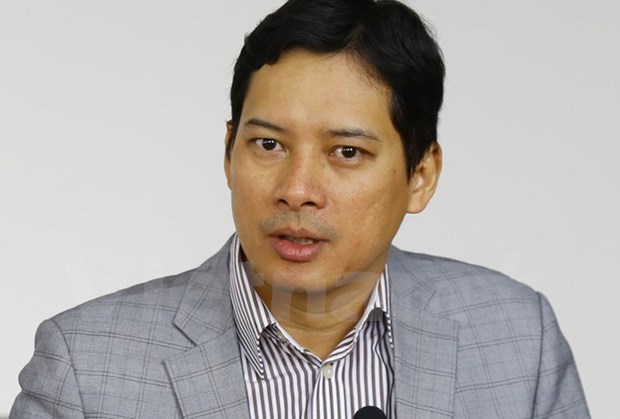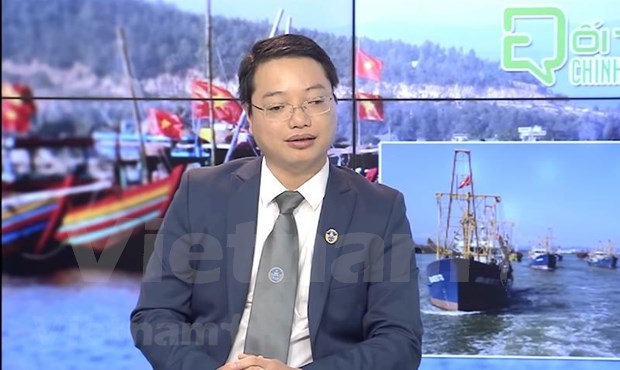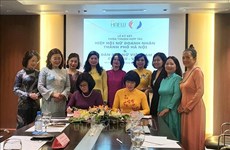Toxic online content: users’ resistance needed
 Illustrative image (Photo: Techweez.com)
Illustrative image (Photo: Techweez.com)Hanoi (VNA) - In recent days, Vietnamese public opinion has been outraged when an application providing Graphics Interchange Format (GIF) on Facebook provides a GIF file containing a distorted portrait of President Ho Chi Minh. Many Facebook users have reported this image to the producer.
A condemnable behaviour
Immediately after receiving reports about this image, the Authority of Broadcasting and Electronic Information (under the Ministry of Information and Communications) has worked with Facebook, requesting the removal and traceability of the above image.
Talking to VietnamPlus reporter, Le Quang Tu Do, Deputy Director of the Authority, said the above offensive GIF image is on Tenor, one of the two sources of GIF images on Facebook besides Giphy, and is likely to be posted by people from abroad.
Currently, there are two types of social networks in Vietnam. One are those provided by domestic enterprises. The other are provided by cross-border foreign businesses into Vietnam such as Facebook, YouTube, Instagram, Twitter, among others.
 Le Quang Tu Do said he has worked with Facebook on the case of distortion of President Ho Chi Minh's image. (Photo: Vietnam+)
Le Quang Tu Do said he has worked with Facebook on the case of distortion of President Ho Chi Minh's image. (Photo: Vietnam+)In order to manage the content on social networks more effectively, Do said there should be more specific and stricter regulations, for instance, requesting foreign social media network providers to set up representative offices in Vietnam.
Doctor of Linguistics Tran Doan Lam, who has many years of research on Vietnamese and world culture, believes that Western culture may have behaviors that distort the image of celebrities, state leaders, but in the Eastern region, and Vietnam in particular, it is a taboo and deserves condemnation.
Cooperation of concerned parties needed to prevent toxic information
According to Msc, Lawyer Nguyen Duc Hung, Deputy Director of TGS Law, Facebook is also responsible for their lack of censorship in this case.
 Lawyer Nguyen Duc Hung, Deputy Director of TGS Law Firm. (Photo:Vietnam+)
Lawyer Nguyen Duc Hung, Deputy Director of TGS Law Firm. (Photo:Vietnam+)Internet users need to help management agencies promptly detect and report wrong behaviors, images, and information so that they can promptly take appropriate actions.
Regarding administrative sanctions, acts of distorting historical facts, denying revolutionary achievements; insulting the nation, famous people or national heroes, but not to the extent of criminal prosecution, shall be subject to a fine of between 70 and 100 million VND. Regarding criminal handling, violators will be subject to warning, non-custodial reform for up to three years or imprisonment from six months to three years.
Building a generation of young Vietnamese immune to toxic culture
Social network users need to be aware of the familiar tricks to avoid being trapped and manipulated. Authorities also need to raise public awareness and education, so that each citizen becomes a wise social network user, with "resistance" and the ability to distinguish official information from toxic ones.
According to Lawyer Hung, each citizen should be responsible for the content they post and access. When detecting false information and images, users need to immediately report them on the social networking platform they are using and ask that platform to remove the content. In case the content still appears, the user can report it to the relevant authority.
Dr. Trinh Le Anh, a lecturer at the University of Social Sciences and Humanities, said when seeing these images, do not like, share, or even comment critically or drop the angry icon, but immediately report to the social network administrator and authorities. “When toxic or fake news is not spread, its creators have failed,” he added./.













